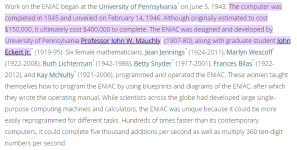JFarrell71
SasqWatch
You really don't see the difference? There's no creativity in fabrication. It's a rote job, done as accurately and quickly and safely as possible, over and over. There's no art, and barely any craft. Machines could replace humans in those jobs because machines can do things more accurately and quickly, nobody cares about their safety (just their maintenance), and machines don't get bored or take smoke breaks.Ok, think about the whole 2.5 centuries of industrialisation and take your pick. That example is the first that came to mind, but it's the same across hundreds of others.
Humans lost their jobs to so many new techs. Have you been to any modern factory ?
We used to need hundreds of workers. I went to one which had less than 20 and everything else had been automated. This was over a decade ago.
In the 16th century everything was done by hand, then machines came along, that took people's jobs, but you wouldn't have a computer writing on RPGWatch if not for all these advances.
With AI, we're talking about using non-thinking, non creative machines to take the place of craftsmen and artists. We're also talking about those computers doing their work with the raw material not of steel and aluminum and silicon, but the creative work done by the people the computers are replacing.


